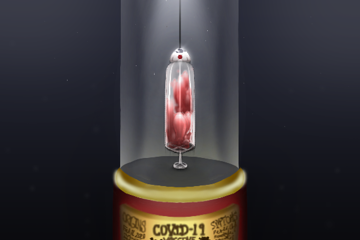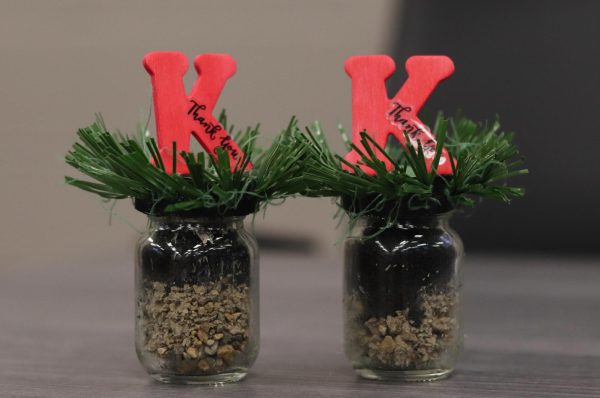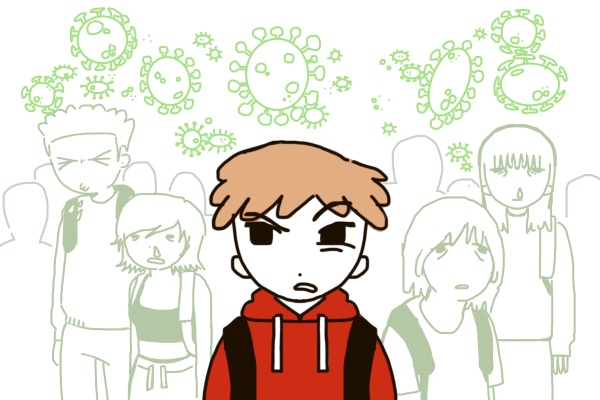COVID vaccine talk: Is it safe or not?

The COVID-19 vaccines are a step forward to helping end the global pandemic.
The discussion about a mRNA vaccine has lingered since the beginning of the COVID-19 pandemic. In response to the global problem, medical experts developed a COVID-19 vaccine in less than a year, trimming off five to ten years of research and trials that are normally required for vaccine development, says MedicalNewsToday. Traditionally, to ensure a safe vaccine for everyone, the more time spent researching the better. However, with the speed of this vaccine’s creation, one question remains: is it safe?
Currently, the Moderna COVID-19 vaccine is authorized for adults 18 and older and the Pfizer vaccine for 16 and older. At this time, studies for children have not been done, so children under 16 are not authorized to take the vaccine. The world is anxiously awaiting a resolution to this deadly virus and questioning if the COVID-19 vaccines are the answers to this problem. According to STAT, an American health-oriented news website, the answer is yes.
Ultimately, vaccines are authorized because the benefits of being vaccinated far outweigh the short term side effects that they may cause, — Wayne C. Koff and Michelle A. Williams, writers for STAT said.
Medical Xpress, a web-based medical and health news service, stated that 80 percent of people that are vaccinated may feel minor side effects.
Just like other vaccines, the COVID-19 vaccine is said to prevent diseases, debilitation and death. However, it doesn’t cancel out all side effects, either. The Food and Drug Administration (FDA) considered and approved of the vaccine in emergency response to the global pandemic. While the FDA has approved the COVID-19 vaccine, different side effects can come into play: including pain, tiredness, headaches, muscle pain, chills and fever. Experts say this is nothing people should worry about. One of the nurses in the Kirkwood School District, Julie Tadros, explains her results when getting the vaccine.
“No, the first vaccine I didn’t have really any side effects, it was fine,” Tadros said, “The second vaccine that I got I had very mild headache and nausea. It was gone within the day.” The following day she had to go back to work, “I had a busy day and I felt fine,” Tadros said. The FDA states that side effects are completely normal because it means our immune systems are working.
Although rare, there are potentially serious side-effects with the mRNA vaccine, such as severe allergic reactions right after injection. This can also be a risk posed by other common vaccines such as the flu and meningitis. The DW, a media organization based in Germany, tells how a couple patients went into anaphylactic shock, where the body becomes hypersensitive due to a life-threatening allergic reaction to an antigen, which is also found in almost any medical treatment. This is followed by reddening of the skin and shortness of breath. The British Medicines and Healthcare Products Regulatory Agency (MHRA) discovered these individuals had not had any previous illnesses and weren’t aware of any ingredients that were causing an allergic reaction to people within the vaccine. For safety precautions, MHRA warned the public with anyone who is allergic to the ingredients in the vaccine or has already suffered anaphylactic shock to not get the vaccination. — Maddie Hickman
While trials for both of the COVID-19 vaccines have moved quickly, scientists have still followed the five phases to create a vaccine. The first phase is the preclinical stage, where all the research comes into play. As Dirk Redlich, Ph. D of Janssen Vaccines, explained, “Our investigational vaccine produces an antigen, or protein, which should cause the body’s immune system to react and get rid of the novel coronavirus.”
So back to the question: is it safe? Experts take a closer look into the vaccine to determine the right dose. In phase one, the preclinical stage, 20 to 80 adults who have received the vaccination are evaluated to determine its safety while also measuring their immune systems and how they respond. Then comes phase 2A, where the experts decide what the best dosage is. Usually, it takes months before they’re able to enter phase three.
Phase three: How effective is the vaccine. Being this far into the clinical trial, more volunteers are able to get measured with the vaccination to see its effectiveness. While gathering data with successful results, phase four is what dictates whether the vaccine is ready for the world or not. This is where the European Commission or the FDA comes into play. Phase four is where the decisions are made regarding whether or not the vaccine is completely safe to use. Once it’s approved and licensed, it can enter the last phase, testing to see if the COVID-19 vaccine will continue to provide the immunity people need to help overcome this virus. Although it’s been given the go ahead, regulatory agencies will continue to monitor, inspect and test the vaccine for potency, safety and purity.
All in all, with approval from the FDA, everyone can move a step forward into finding an end to this virus. With this vaccine, people are expecting to have the ability to take an extra breath, loosen up and get excited about the ending of the deadly virus.
Your donation will support the student journalists of Kirkwood High School. Your contribution will allow us to purchase equipment and cover our annual website hosting costs.

She/Her
Hobbies and Interests: softball, pickle ball, writing, swimming and hanging out with friends
Favorite song: Baby, I Love Your Way by Big...

Interests: Music and art.
Favorite musical artist: Michael Jackson.
Favorite quote: "If you want to make the world a better place, take a look...















